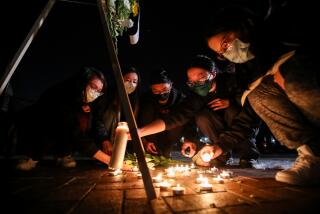Lam Murder Trial Jury to Visit Office of Slain Professor
- Share via
Jurors in the murder trial of Minh Van Lam will visit the bloodied Cal State Fullerton office today where physics professor Edward Lee Cooperman was shot to death last Oct. 13.
Cooperman, known for his scientific and humanitarian aid to the Communist government in Vietnam, bled to death on the office floor. Lam, 21, a former student of Cooperman, claims the gun went off accidentally when Cooperman grabbed his arm to show him how to aim the weapon.
Cooperman’s friends say they believe the professor was assassinated by anti-Communist elements. The prosecution has advanced no theories as to a motive for the shooting.
On what is expected to be the final day of defense testimony, the five men and seven women jurors will get their first look at the office they have seen depicted in numerous photographs, in a videotape reenactment of the shooting and on a large wall chart in Orange County Superior Court Judge Richard Beacom’s courtroom.
Following developments in court Wednesday, friends of Cooperman said that theories to explain Cooperman’s behavior before his death, put forth before the trial opened by defense attorney Alan May, are proving to be groundless.
May claims that Cooperman not only feared assassination from anti-Communists in the Vietnamese community, but that Hanoi government officials were angry with him for providing off-brand computers instead of the Apple computers they expected. According to May, Cooperman also feared being exposed by U.S. authorities for illegally shipping computers and other high-tech equipment to Vietnam.
All of those fears, May has maintained, prompted Cooperman to obtain pistols and surround himself with a cadre of young Asian men wearing leather jackets.
Active Investigations
But May said Wednesday that he will not pursue further his allegation that Cooperman shipped high-technology equipment to Vietnam in violation of U.S. laws. Out of the presence of the jury, May advised the court that he will not call witnesses from the FBI and U.S. Commerce Department to testify about the shipments to Vietnam.
May said spokesmen for the Commerce Department and the Senate Permanent Subcommittee on Investigations had advised him that they are looking into Cooperman’s overseas shipments. Those investigations, May said, make it unlikely that federal officials will consent to testify in the murder trial. Federal agents also cannot be forced to testify in local courts, he said.
May later told reporters that whether the shipments were illegal is “not the heart of the case.” The testimony he hoped to receive from federal officials was needed only to show that Cooperman lived in fear, May said. Several witnesses’ testimony already has established that Cooperman was fearful, he said.
Defense Dealt Blow
Former Pentagon Papers defendant Anthony Russo and Cal State Fullerton student Mona Simpson testified Wednesday that in the weeks before Cooperman was shot to death, he told them that he feared assassination by right-wing Vietnamese gangs.
Russo testified that he had seen Cooperman on several occasions “kidding around” and grabbing friends’ hands, then pulling their arms behind their backs, which he referred to as a self-defense maneuver.
The defense case also was dealt a blow Wednesday when Judge Beacom refused to allow in evidence numerous handwritten notes recovered from Cooperman’s belongings. The notes referred to computer purchases and shipments. Beacom also rejected as evidence numerous photographs and slides of young men in black leather jackets, which May tried to place before the court.
May said, however, that testimony already has established that Cooperman liked to surround himself with young men in black leather jackets.
“His (May’s) whole web of innuendo is crumbling,” Russo said after testifying. “It just shows what we said at the beginning--there’s nothing to it.”
More to Read
Sign up for Essential California
The most important California stories and recommendations in your inbox every morning.
You may occasionally receive promotional content from the Los Angeles Times.









